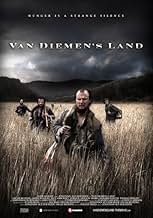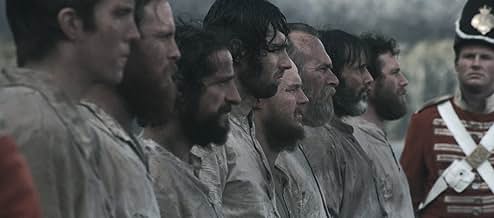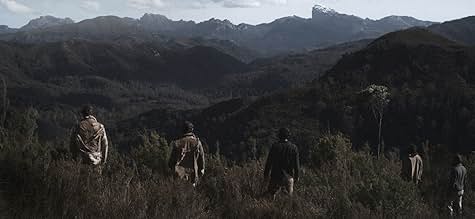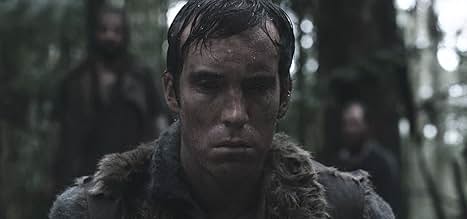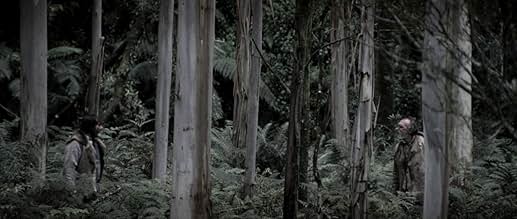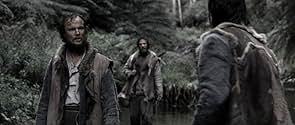IMDb रेटिंग
5.9/10
3.5 हज़ार
आपकी रेटिंग
अपनी भाषा में प्लॉट जोड़ेंAlexander Pearce, Australia's notorious convict, escaped Macquarie Harbour in 1822, finding the harsh Australian wilderness and abandoning hope in the harsh Australian wilderness.Alexander Pearce, Australia's notorious convict, escaped Macquarie Harbour in 1822, finding the harsh Australian wilderness and abandoning hope in the harsh Australian wilderness.Alexander Pearce, Australia's notorious convict, escaped Macquarie Harbour in 1822, finding the harsh Australian wilderness and abandoning hope in the harsh Australian wilderness.
- निर्देशक
- लेखक
- स्टार
- पुरस्कार
- 2 जीत और कुल 1 नामांकन
Thomas M. Wright
- Thomas Bodenham
- (as Thomas Wright)
Zane Pinner
- Convict
- (बिना क्रेडिट के)
फ़ीचर्ड समीक्षाएं
Grim. Relentless. Unsettling. Frightening even. This film leaves nobody sitting comfortably whilst they watch it.
This is 'us' when the thin veneer of being 'civilized' is stripped away. When all that Life has left you is no future, a few rags and a brutalized nature then the consequences can reach unfathomable depths.
I've read some of the negative reviews for this film and can understand it when viewers who watch 'sanitized' Technicolor visions of what are classed as the 'norm' that is their benchmark and they don't like concepts that stray beyond that. But when one has watched unglamourous brutality and emotions in such good, raw films like Saving Private Ryan, Last of the Mohicans, Apocolypta, Fateless and the superb Kokoda, then one can appreciate what this true-life film was trying to achieve.
There are no heroes in this film and no villains, just survivalists. From the uniformed officers and men posted to what seemed a god-forsaken land, to the convicts they had control of, they all had one thing in common the desire not to be there!
I'll not watch this film again for a couple of months as I'd like my senses to be on an even keel next time, but already I'm looking forward to it.
This is 'us' when the thin veneer of being 'civilized' is stripped away. When all that Life has left you is no future, a few rags and a brutalized nature then the consequences can reach unfathomable depths.
I've read some of the negative reviews for this film and can understand it when viewers who watch 'sanitized' Technicolor visions of what are classed as the 'norm' that is their benchmark and they don't like concepts that stray beyond that. But when one has watched unglamourous brutality and emotions in such good, raw films like Saving Private Ryan, Last of the Mohicans, Apocolypta, Fateless and the superb Kokoda, then one can appreciate what this true-life film was trying to achieve.
There are no heroes in this film and no villains, just survivalists. From the uniformed officers and men posted to what seemed a god-forsaken land, to the convicts they had control of, they all had one thing in common the desire not to be there!
I'll not watch this film again for a couple of months as I'd like my senses to be on an even keel next time, but already I'm looking forward to it.
A peculiar ghostly experience aside from the frequent and grotesque close ups of people masticating. The film starts with a supercilious officer slurping down some slimy bits of what looks like sea food (mollusks?) and moves onto the timber cutting scenes where the guard tries to cheer up the convicts - 'freedom is work lads, finish this and we go back'. Well, they might have listened to him. Instead, for the next two hours, we are stuck in the forests of Tasmania with the convicts after their 'escape', their numbers quickly diminishing as they take to slurping down tasty bits of each other. Again, as with too many films where there are a lot of male characters together - another is Carpenter's 'The Thing' - it is often difficult distinguishing one guy from the other, especially as most have beards here.. Yes, I kept flinching at the horrendous violence, but can't say I cared much for any of the victims - aside from the first, who seemed the most interesting and charismatic. In that respect, despite great images of trees in the wind and evocative music, it was a bit of a slog, just waiting for the next one to die, and knowing the historical outcome anyway. (It didn't help that my version lacked subtitles and the melancholic narration was in Irish!). But the most memorable thing here is the overall mood of despair and doom in a washed out landscape - largely filmed in gray to add to the sense of coldness and desolation (in fact it's probably beautiful and sunny most of the year!). Was it also intentional to not include one single animal in the entire film:? Perhaps the sight of another living creature would have lightened the mood so it was avoided (aside from the mention of one snake being seen). In fact, we never leave the company of these demented convicts who were better off staying prisoners and serving their sentences. Even when a small group of three break away and leave the main group of nutters, we never see these three again - no respite from our time among the cannibals. Meanwhile the constant beauty of the nature around them made me think: yes, lucky country if the company were a bit cheerier.
It definitely worth watching! It is a film that reveals the evil side of the humanity, but because it is not an action film or a romantic film, so i give it 8/10. Also, the reflection on humanity disgusted me and which define the film as a thriller. It is a good opportunity to know the history by watching this film, and to think about what action we would take if we were in that position, deeply review ourselves.
Having seen a documentary about this story a few years ago, I was enraptured by the story and absorbed until its conclusion. When I heard a film was in production, I was interested to see how it would be translated into a motion picture.
This should by no means considered a film that delivers on the potential of this story.
I suspect budgetary restraints ruled out the possibility of opening scenes such as the prisoner's arrival at Hell's Gates as the prisoners rowed for their lives through the stormy sea. Scenes in the courtroom where Pearce is confronted with the horror of his deeds were similarly ruled out. I also believe budgetary restraints were at the root of so much of the landscape views of Tasmania we were 'treated' to- a previous comment said the film works as an ad for the area, I didn't rent the film to see an ad for the landscape of Tasmania!
In one scene the director focuses on a mountain top for longer than five seconds (It was long enough for the thought to enter my mind- did he hike up here with a camera and say, well I made it up here so this shot is taking up at least six seconds of this movie!)
Budgetary constraints doesn't mean the film couldn't have been successful, engrossing, and in some ways this gave it an advantage over any big-budget films that may succeed it. Whereas they would spend time on back-story, by cutting straight to the shock value of the cannibalistic 'middle part of a possible trilogy' as suggested by an earlier comment, Auf Der Heide could have given a definitive interpretation of it. Time saved on earlier scenes could have been used to give more depth to the inter-group dynamics, leaving the viewer wondering 'who would be voted off next', in a Survivor-like scenario.
If you're making a film like this with a low budget, the focus has to be more on the human aspects of the group. For this to work, a strong narrative voice explaining the group dynamics was needed. Pearce would have been ideal for this, but instead we were presented with 'the quiet man', which proved disastrous.
Where could the film have succeeded in the context of it having a relatively low budget? How could it have better elicited tension and emotions?
· Fleeing the prison- dialogue about having to escape the deadly conditions would have helped us see the need for escape
· The decision to resort to cannibalism- the portrayal of how the resources diminish isn't done in a way that builds tension, it's merely documented. Members of the party were unaware whilst the others plotted, and the first murder took place at night while the first victim slept. This scene should have been shot through the ignorant ones' eyes as they wonder what's become of the group.
· This could have been followed by dialogue between the two who ran away about how they thought they were next and the plan of their subsequent escape from the group.
· Explaining the sub-groups; the miracle of Pearce's survival is that he was the outsider from the point where there was at least 4 left and in theory he should have been next in the pot. A narrative from him detailing these fears could have done wonders.
· When it came down to the two men, the pact that took place between the two men to renounce cannibalism has no place in the film. This could have been developed the theme, added to the tension as we question the two men's sincerity or even broken the pervasive silence.
· There was no moment of catharsis where he reaches the village and is 'saved', if a man can be saved after what he has been through.
Ultimately it's a poor script that failed to bring out the potential of the subject matter or to deliver any character I would either remember (the Alexander Pearce of my memory is the one whose character was explored in the documentary I saw) or whose survival I actually cared about even in the closing scenes of such dramatic potential.
This should by no means considered a film that delivers on the potential of this story.
I suspect budgetary restraints ruled out the possibility of opening scenes such as the prisoner's arrival at Hell's Gates as the prisoners rowed for their lives through the stormy sea. Scenes in the courtroom where Pearce is confronted with the horror of his deeds were similarly ruled out. I also believe budgetary restraints were at the root of so much of the landscape views of Tasmania we were 'treated' to- a previous comment said the film works as an ad for the area, I didn't rent the film to see an ad for the landscape of Tasmania!
In one scene the director focuses on a mountain top for longer than five seconds (It was long enough for the thought to enter my mind- did he hike up here with a camera and say, well I made it up here so this shot is taking up at least six seconds of this movie!)
Budgetary constraints doesn't mean the film couldn't have been successful, engrossing, and in some ways this gave it an advantage over any big-budget films that may succeed it. Whereas they would spend time on back-story, by cutting straight to the shock value of the cannibalistic 'middle part of a possible trilogy' as suggested by an earlier comment, Auf Der Heide could have given a definitive interpretation of it. Time saved on earlier scenes could have been used to give more depth to the inter-group dynamics, leaving the viewer wondering 'who would be voted off next', in a Survivor-like scenario.
If you're making a film like this with a low budget, the focus has to be more on the human aspects of the group. For this to work, a strong narrative voice explaining the group dynamics was needed. Pearce would have been ideal for this, but instead we were presented with 'the quiet man', which proved disastrous.
Where could the film have succeeded in the context of it having a relatively low budget? How could it have better elicited tension and emotions?
· Fleeing the prison- dialogue about having to escape the deadly conditions would have helped us see the need for escape
· The decision to resort to cannibalism- the portrayal of how the resources diminish isn't done in a way that builds tension, it's merely documented. Members of the party were unaware whilst the others plotted, and the first murder took place at night while the first victim slept. This scene should have been shot through the ignorant ones' eyes as they wonder what's become of the group.
· This could have been followed by dialogue between the two who ran away about how they thought they were next and the plan of their subsequent escape from the group.
· Explaining the sub-groups; the miracle of Pearce's survival is that he was the outsider from the point where there was at least 4 left and in theory he should have been next in the pot. A narrative from him detailing these fears could have done wonders.
· When it came down to the two men, the pact that took place between the two men to renounce cannibalism has no place in the film. This could have been developed the theme, added to the tension as we question the two men's sincerity or even broken the pervasive silence.
· There was no moment of catharsis where he reaches the village and is 'saved', if a man can be saved after what he has been through.
Ultimately it's a poor script that failed to bring out the potential of the subject matter or to deliver any character I would either remember (the Alexander Pearce of my memory is the one whose character was explored in the documentary I saw) or whose survival I actually cared about even in the closing scenes of such dramatic potential.
This feels like a 'Tourism Tasmania' commercial with a touch of cannibalism, truly a great combination.
The movie is based on the true account of Alexander Pearce, Australia's most notorious convict, and the events that took place in 1822, as Pearce and a group of convicts escape into the Tasmanian wilderness. The group is then left at the mercy of nature, themselves, and notably the human desire to eat.
This is truly a beautiful movie, the cinematography of sweeping landscapes and rugged bushland is worth watching the rental/ticket price alone. It strikes me as the type of DVD they play in appliance stores to show off the new HD-TVs (although they would have to skip the numerous bludgeoning scenes).
The story itself is a simple and tight narrative of the human condition pushed to its limits. While there is some grizzly violence and confronting concepts, the movie never descends into gratuitous visuals based purely on shock value.
While the story is compelling and rolls along nicely, I found myself just wanting a little more depth to all of the supporting characters. This is also one of the main strengths of this film, it makes you want more; I was always wondering what was going to happen next, what's that guy going to do, where are they going, what's around that corner, what does that taste like etc Ultimately this factor leaves the viewer a tad unsatisfied yet appreciative of the movie as a whole.
On the Fruit-Meter, Van Demons Lands gets the "KIWI-FRUIT" - A bit grizzled and rough on the outside, but once you peel off the skin it's fresh and tasty, but it was a small fruit and I want some more.
MART-FLIX PUN-FUN – It's compelling to watch convicts battle their inner "demons" ..that sucked
The movie is based on the true account of Alexander Pearce, Australia's most notorious convict, and the events that took place in 1822, as Pearce and a group of convicts escape into the Tasmanian wilderness. The group is then left at the mercy of nature, themselves, and notably the human desire to eat.
This is truly a beautiful movie, the cinematography of sweeping landscapes and rugged bushland is worth watching the rental/ticket price alone. It strikes me as the type of DVD they play in appliance stores to show off the new HD-TVs (although they would have to skip the numerous bludgeoning scenes).
The story itself is a simple and tight narrative of the human condition pushed to its limits. While there is some grizzly violence and confronting concepts, the movie never descends into gratuitous visuals based purely on shock value.
While the story is compelling and rolls along nicely, I found myself just wanting a little more depth to all of the supporting characters. This is also one of the main strengths of this film, it makes you want more; I was always wondering what was going to happen next, what's that guy going to do, where are they going, what's around that corner, what does that taste like etc Ultimately this factor leaves the viewer a tad unsatisfied yet appreciative of the movie as a whole.
On the Fruit-Meter, Van Demons Lands gets the "KIWI-FRUIT" - A bit grizzled and rough on the outside, but once you peel off the skin it's fresh and tasty, but it was a small fruit and I want some more.
MART-FLIX PUN-FUN – It's compelling to watch convicts battle their inner "demons" ..that sucked
क्या आपको पता है
- ट्रिवियाOne of three Australian feature films made during the late 2000s about Irish convict Alexander Pearce. The three movies are: 'Dying Breed' (2008), 'Van Diemen's Land' (2009) and 'The Last Confession of Alexander Pearce' (2008) (TV).
- भाव
Alexander Pearce: A man with no blood on his hands is no man.
- कनेक्शनFeatured in A Journey Up River: Making Van Diemen's Land (2009)
टॉप पसंद
रेटिंग देने के लिए साइन-इन करें और वैयक्तिकृत सुझावों के लिए वॉचलिस्ट करें
- How long is Van Diemen's Land?Alexa द्वारा संचालित
विवरण
बॉक्स ऑफ़िस
- दुनिया भर में सकल
- $34,648
- चलने की अवधि
- 1 घं 44 मि(104 min)
- रंग
- ध्वनि मिश्रण
- पक्ष अनुपात
- 2.35 : 1
इस पेज में योगदान दें
किसी बदलाव का सुझाव दें या अनुपलब्ध कॉन्टेंट जोड़ें

